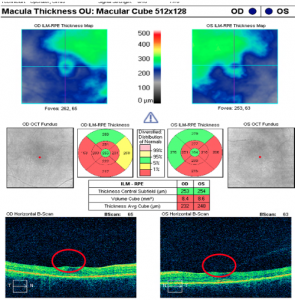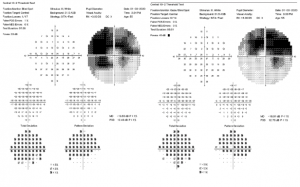Dr. Noskow’s Case Report
Plaquenil Toxicity
Why it’s important to get your eyes routinely checked when on certain high- risk medications!
What is plaquenil?
Plaquenil is a medication commonly used in patients that have Rheumatoid Arthritis (RA), Systemic Lupus Erythematosus (SLE), Sjogrens Syndrome, and other inflammatory and autoiummune disorders.
What are risk factors for developing retinal toxicity from Plaquenil?
- Age older than 60
- Daily dose of more than 6.5mg/kg
- Use of plaquenil for more than 5 years
- Obesity
- Pre-existing retinal disease
- Renal or liver failure
All patients should have a “baseline” screening appointment PRIOR to starting plaquenil or other “high risk” medications
AFTER plaquenil is started, patients should be screened YEARLY.
A 55 year old female, with Sjogren’s Syndrome, presented to Hollywood Eye Institute with a chief complaint of decreased peripheral vision and has noted that she is bumping into things frequently over the past few months. This patient was diagnosed with Sjogrens Syndrome 4 years prior and has been on Plaquenil 200mg twice a day. This patient also has the common complaint of dry eyes secondary to Sjogrens Syndrome and is currently being treated with Xiidra 2x/day both eyes.
Her uncorrected vision was 20/25- right eye and left eye. Her pupils were normal with no APD noted. Confrontation fields were FULL in both eyes. Upon dilation and retinal examination it was clear to see that she had “Bulls Eye Maculopathy”
What is Bulls Eye Maculopathy?
- This occurs when melanin is able to bind to the “High Risk Medication” Plaquenil within the Retinal Pigment Epithelium (RPE) as well as direct toxicity to retinal ganglion cells. The drugs ability to bind to these pigmented cells creates a “Bulls Eye” around the macula, giving it this very unique appearance.
Upon further testing with an OCT scan through the macula, you can clearly see the parafoveal outer retinal atrophy, as seen below:

Humphrey Visual Field (10-2) Testing demonstrates a paracentral scotoma which is consistent with this macular toxicity that occurs with Plaquenil:

This patient was diagnosed with macular toxicity, secondary to plaquenil use. She was educated to discontinue plaquenil and is following up with a retina specialist.
These are the tests that are done for patients that are on the “High Risk Medication”, Plaquenil, so that small changes in the macula can be detected early on, and reduce risk of vision loss.
To have your eyes checked for any major ocular diseases, make an appointment with Dr. Noskow. Give our office a call or simply schedule an appointment via ZocDoc.
On social media? Like us on Facebook & Follow us on Instagram
